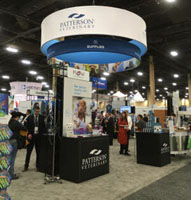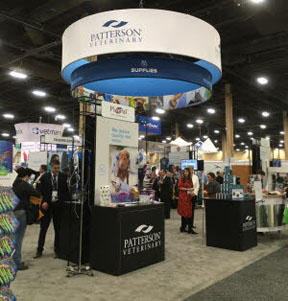Animal Health International sentenced for selling Rx drugs to unauthorized buyers

Patterson 288

VIN News Service photo
Patterson Companies Inc. sells veterinary and dental products in the U.S., Canada and the U.K. It has a large presence in animal health circles, as demonstrated on the trade show floor of Western Veterinary Conference in Las Vegas in February.
Officials with Patterson Companies Inc. say "sweeping enhancements" have been made to their infrastructure in response to a federal investigation that found its subsidiary, Animal Health International (AHI), illegally distributed prescription veterinary drugs to wholesalers and non-veterinarians.
The criminal activity, which began in 2012, has cost Patterson and AHI nearly $52 million in fines and forfeiture money, according to a plea agreement authorized Monday by Judge James P. Jones of the U.S. District Court for the Western District of Virginia. The agreement also mandates one-year probation for AHI and requires Patterson to demonstrate appropriate compliance procedures via an annual certification process, through June 2023.
"We remain committed to operating in an ethical and compliant way, so that we can remain a trusted partner for our customers," Patterson stated today by email to the VIN News Service.
Authorities first alerted company officials that AHI was the target of a criminal investigation during the summer of 2018. An investigation into corporate parent Patterson followed.
Assistant U.S. Attorney Randy Ramseyer, who prosecuted the case, said by email that federal officials began to suspect that a drug distribution scheme was underway when a cow from a farm in Halifax County, Virginia, bound for slaughter, was found with violative levels of the parasiticide doramectin in its liver.
The U.S. Food and Drug Administration Office of Criminal Investigations, with the assistance of the Virginia Department of Health Professions, uncovered that individuals had illegally obtained drugs from AHI and distributed them in Tennessee and Virginia.
The drugs were primarily antibiotics, mainly Draxxin and Excede, Ramseyer said. "If a drug is distributed outside of the authorized supply chain or pursuant to prescriptions issued beyond the scope of a veterinarian's practice, they are 'misbranded,' " he explained.
AHI pleaded guilty in February to charges of introducing misbranded drugs into interstate commerce and agreed to pay a $5 million fine; give $1 million to the Virginia Department of Health Professionals and forfeit to the U.S. Marshals Service $46,802,203 that had been obtained from the illegal drug shipments.
"The court is advised that all of these amounts have been paid in full," Judge Jones said on Monday during AHI's sentencing hearing, held remotely.
While lauding AHI and Patterson for rectifying the matter, Ramseyer underscored the serious nature of the case.
"It affects the supply of meat that goes to human beings," he said at the hearing. "That's the concern, and we have a situation where drugs were being distributed without being in the proper distribution chain, when there's not a proper veterinary-patient relationship with the animals; all of those things can contribute to major health problems."
Amy Conway-Hatcher, of Baker Botts LLP in Washington, D.C., representing AHI during the sentencing hearing, said the company "certainly regrets the violation."
According to the company, the compliance procedures it will follow include:
- hiring a chief compliance officer who reports directly to CEO Mark Walchirk and is responsible for overseeing compliance with federal and state statutes/regulations concerning prescription drug distribution;
- establishing a compliance committee on the Board of Directors and a management compliance committee comprised of senior officials;
- conducting a comprehensive review of the compliance program to evaluate its structure, strategy and resources with the overall goal of preventing, detecting and correcting compliance risks;
- making modifications companywide of prescription drug product licensing, dispensing, distribution and related sales processes.
AHI, based in Greeley, Colorado, is a major player in the sale of products and services to veterinary clinics and to farmers and ranchers in the equine, cattle, poultry and swine industries. In 2015, Patterson Companies acquired AHI for a reported $1.1 billion. Patterson also owns Patterson Veterinary Supply (formerly Webster Veterinary Supply), a subsidiary that is one of the largest U.S. distributors of products to veterinary clinics. Joining with AHI more than doubled Patterson's veterinary business, analysts said.
Bria Townshend in Patterson corporate communications answered some questions from VIN News but not others, including whether Patterson was aware of AHI's illegal activities at the time it acquired the company or whether anyone was fired as a result.
According to court documents, AHI had aided in the distribution of misbranded veterinary drugs throughout the United States since 2012. The bulk of AHI's illegal activity, with sales over $46 million, involved instances in which AHI shipped prescription drugs directly to an end-user, which is illegal in many states, or to places where AHI did not have the proper licenses to ship products, Ramseyer said by email.
Another $7.4 million in illegally distributed AHI products were linked to two longtime AHI customers who pleaded guilty in 2016 and 2017 in U.S. District Court to federal felony conspiracy charges related to the case. Marlin Webb and Billy K. Groce were not licensed to receive, transport, store or distribute prescription veterinary drugs, authorities said, yet they received and sold them.
Federal officials say Groce, of Knoxville, Tennessee, operated a business created for the purpose of flouting FDA regulations of the interstate shipment and labeling of veterinary drugs. Court documents show he was able to acquire prescription drugs from AHI with help from a veterinarian, now deceased, who wrote fraudulent prescriptions. Groce shipped the drugs to his co-conspirator, Webb, who was store manager of the Carroll County Cooperative in Hillsville, Virginia. In court, Webb admitted to illegally selling the prescription drugs through the cooperative.
Groce was sentenced to four months in prison for defrauding the United States by impeding and obstructing the FDA. Webb received a year of probation and was fined $125,000.